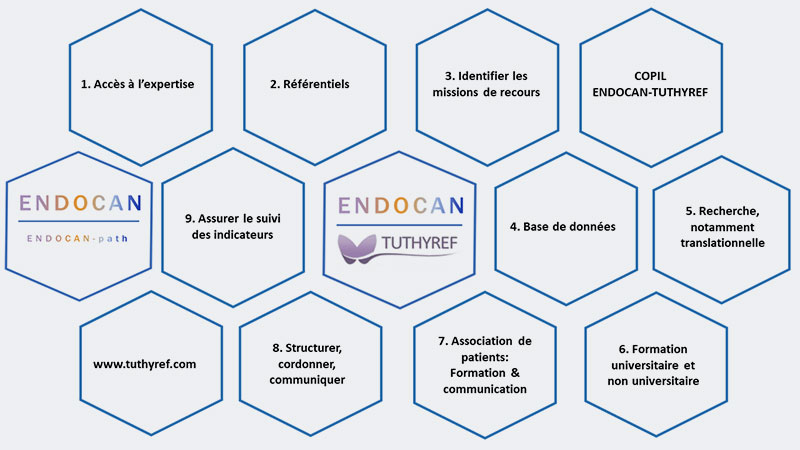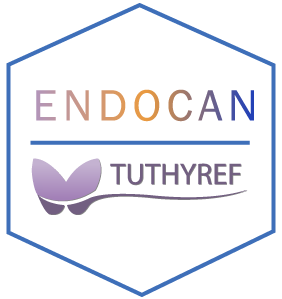- Anaplastic thyroid cancer
 www.e-cancer.fr
www.e-cancer.fr - Locally advanced or metastatic medullary thyroid cancers that are not responsive to standard treatments.
 Read
Read
These cancers are rare, with an estimated incidence in France of 350-400 new patients per year, comprising around 250 differentiated cancers, 50 medullary cancers and 100 anaplastic cancers.
The ENDOCAN-TUTHYREF network is responsible for carrying out 9 missions defined by the French National Cancer Institute (INCa):

Facilitate access to expertise for all patients: National Multidisciplinary Consultation Meetings (RCP) organized twice a month, designation of expert centers, organization of double anatomo-pathological readings, procedures, clinical data collections.
Development of guidelines specific to the ENDOCAN-TUTHYREF network.
Identify referral missions: clinical trials dedicated to refractory thyroid cancers, early phase I/II trials, expertise in surgical and interventional radiology (RI), vectorized internal radiotherapy (VIR), etc.
National anonymized clinical database.
Develop clinical and translational research projects that are discussed and collaboratively validated.
Develop and ensure standardization of university/non-university education on refractory thyroid cancers.
Strengthen links, communication, and education for patients.
Structure, coordinate, and communicate.
Ensure monitoring of quality and safety indicators defined by the network for INCa.
THE STRUCTURE OF THE ENDOCAN TUTHYREF NETWORK
The ENDOCAN TUTHYREF network includes one or more expert centers per region in metropolitan France and the overseas territories. The two national coordinating centers are Gustave Roussy and University Hospital Center (UHC) of Lyon : they lead the network with the support of the steering committee and are responsible for achieving the objectives.
Each regional expert center of the ENDOCAN TUTHYREF network is composed of physicians from different specialties involved in the management of refractory or advanced thyroid cancers: endocrinology, surgery, nuclear medicine, medical oncology, anatomo-pathology, radiotherapy, biology, diagnostic and interventional radiology, gathered within a Regional Multidisciplinary Consultation Meeting (RCP).
The regional expert center's mission is to manage patients with refractory thyroid tumors at the regional level and record anonymized patient data in the national database, in the absence of patient opposition to this recording. It organizes this management within regional RCPs, which discuss the treatments and/or surveillance to be implemented, assess the indication for molecular tests, request an anatomo-pathological rereading by an expert from the ENDOCAN-path network to confirm the diagnosis, and discuss possible therapeutic trials and medical studies that could be proposed to the patient.
When additional multidisciplinary opinions from physicians in different regional expert centers are needed, cases can be presented and discussed at the national RCP, which takes place twice a month in the form of web conferences.
The regional and national RCPs of the ENDOCAN-TUTHYREF network thus allow every French patient, regardless of their location in the country, to access the best possible medical care tailored to their condition and to access therapeutic innovation and open clinical trials in France for refractory thyroid cancers.
The ENDOCAN TUTHYREF network is animated and managed nationally by the steering committee (Steering Committee), which meets once a month via web conference. The Steering Committee ensures the coordination of working groups responsible for implementing the detailed missions above. The network coordinators are responsible for budgets and the allocation of funds to different regional centers. They annually report on the use of INCa budgets to the Steering Committee and the network's General Assembly. The Steering Committee also acts as the scientific council of the network, meeting every two months to discuss various research projects led by network physicians.
The annual ENDOCAN-TUTHYREF meeting, attended by all network stakeholders, allows for comprehensive information for all these actors and the selection and initiation of consensus projects within the network

